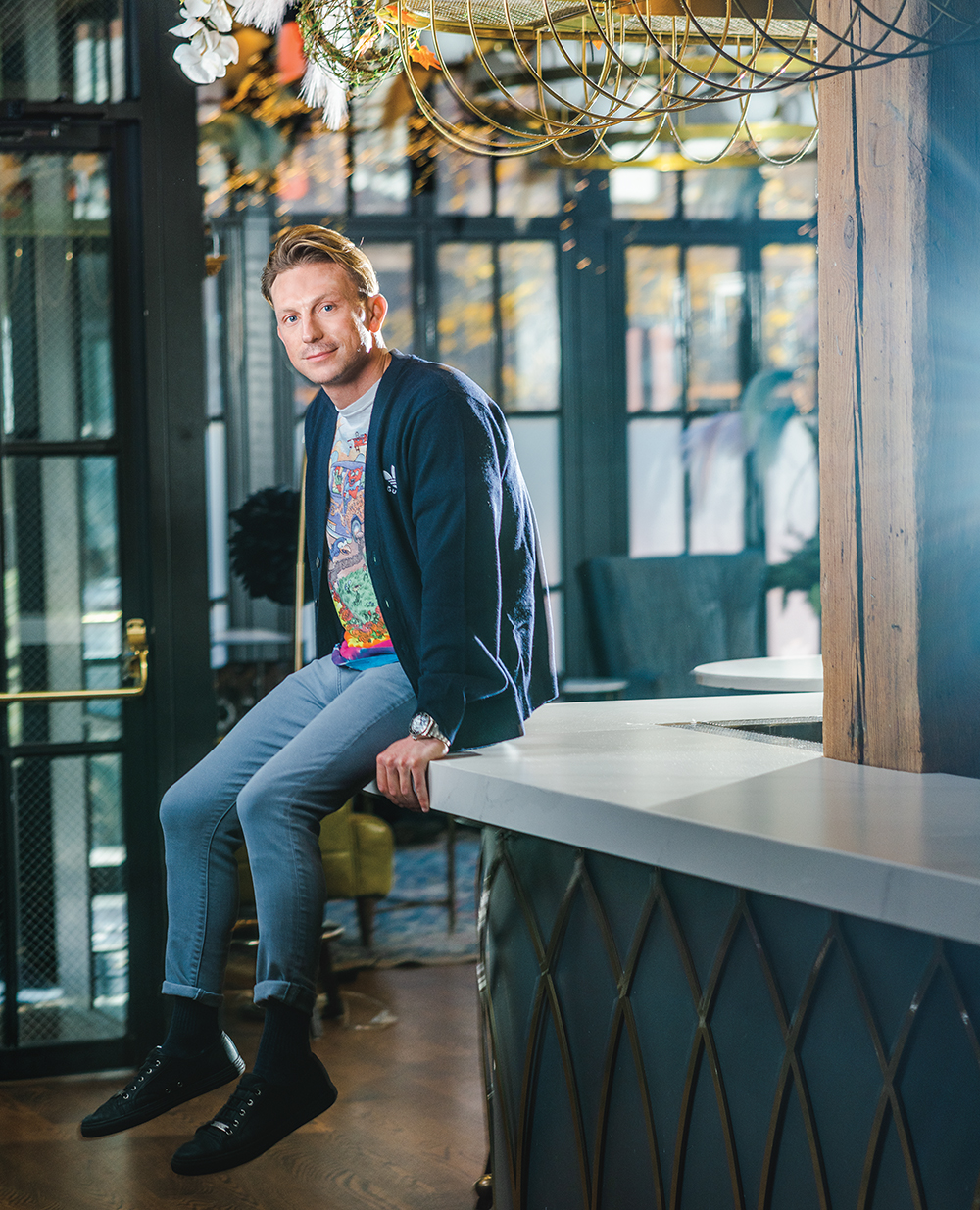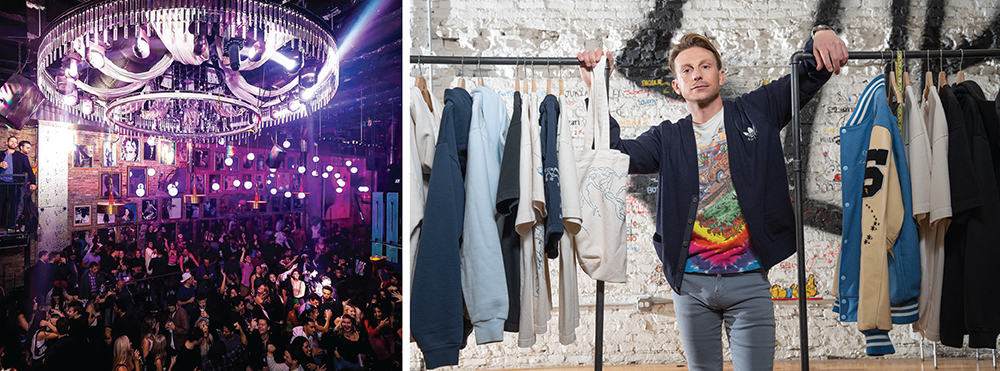Serial Entrepreneur

Carmen Rossi at Hubbard Inn, located in Chicago’s River North neighborhood. (Image by Lenny Gilmore)
It’s astonishing that Carmen Rossi, ’07 LAS, MS ’09 AHS, ever had time to go to class.
As an undergraduate at Illinois, he started a business that built dormitory lofts and rehabbed heating fixtures. He launched a painting company that hired students, outfoxing national competitors that came to campus to do the same. He opened a travel agency and sold spring break trips.
“I was never intimidated by the concept of risk,” Rossi says. “When you’re young, the worst-case scenario is a scraped knee. Your friends are still going to buy you a beer if you lose all your money.”
We’ll come back to Champaign. Rossi did—he’s in his third year as an adjunct faculty member in the College of Applied Science’s Dept. of Recreation, Sports & Tourism (RS&T). But let’s first drop by the Hubbard Inn, which he reopened to great acclaim in 2015. Considered a fixture of Chicago’s River North neighborhood, the renovated three-story space serves as the headquarters of 8 Hospitality, the restaurant, hospitality development and management company Rossi founded in 2013.
Today, he operates more than 40 companies, including such Chicago venues as Cardozo’s Pub, an old-school downtown restaurant and bar; The Dime, a sports bar located near DePaul University; and HVAC Pub, near Wrigley Field. Many of his venues were inspired by the three campus bars where he worked to help pay tuition.
Rossi puts a premium on location and sees further potential in Hubbard Inn’s lively River North neighborhood. He’s a big believer in community and getting to know what’s going on. He visits a neighborhood, scouts it and then scouts it some more.
“I just about move into the neighborhood,” Rossi says, during the first time we met in 2020. “I go to neighborhood meetings and talk with interested shareholders. I see what they think is missing. Then I’ll start the design and build in-house. Most hospitality groups focus on a particular genre and extrapolate. We don’t. I have sports bars and neighborhood bars. I have French restaurants and Italian restaurants and European-inspired shared plates. I’m big on pizza. Pizza is sharable. Pizza is community dining.”
As he likes to say, “Dining is not simply a warm dish and a cold pint. There are more than 7,000 liquor licenses in the city of Chicago. That’s a lot of competition.”
Rossi’s business strategy doesn’t begin to describe his reach. In 2015, former Chicago Mayor Rahm Emanuel appointed Rossi to the City of Chicago Landmark Commission in recognition of his support of local culture. The following year, then Illinois Gov. Bruce Rauner asked him to serve on the Illinois Economic Development Board, a post that was renewed by current Gov. JB Pritzker.
If all that wasn’t impressive enough, Rossi also is a lawyer. He completed his law degree at Northern Illinois University in 2012 and founded City Lake Law in Chicago, which works with clients from the entertainment, real estate and hospitality industries.
Law, of all possible careers, originally seemed the most likely to grab Rossi’s attention. He grew up in Frankfort, Ill., the son of a father who he describes as a briefcase lawyer. “He’d come to wrestling matches or soccer practices with his briefcase on his lap.” While Rossi’s mom worked as an administrative assistant at the local high school, his dad went on to become a judge.
Rossi’s own legal career may have peaked when he clerked at the Will County State’s Attorney’s office and was told to pull all autopsy records on fatal bathroom falls. That request came as preparation for the trial of ex-police officer and accused murderer, Drew Peterson, who claimed his second wife had overdosed on heroin, hit her head on a bathtub soap dish and drowned.
“Do you know how many fatal bathtub falls were caused by a heroin overdose since they started keeping records in the 1970s? Basically none,” Rossi says. “The likelihood of losing consciousness and drowning was non-existent.
“But I never had any interest in criminal law,” he continues. “Instead, I got a job with an appellate firm where I could respond to court briefs with the help of the Internet. I had plenty of time to duck out and drive downtown and look at potential hospitality ventures.”
“I was never intimidated by THE concept of risk. When you’re young, the worsT-case scenario is a scraped knee. Your friends are still going to buy you a beer if you lose all your money.”
Those reconnaissance outings have remained a constant. A week after our first chat, Rossi and I met at Hubbard Inn and took a short drive to Halsted Street to check out a gutted building in Chicago’s Greektown, where he hoped to resurrect Stanley’s Kitchen & Tap. That legendary hangout in the city’s Lincoln Park neighborhood was the spot where a crowd ranging from Blackhawks fans to Cubs players partied, and everyone climbed on the karaoke stage.
Rossi bought the place in 2015, but closed it a few years later in 2018 when its lease expired. He had been hunting for a new venue since then, and the Greektown site topped the few contenders. Adjacent to Athena Greek Restaurant, the place was a cavernous bare-brick space and so dark that Rossi and his team had to navigate by lights on their cell phones as they sidestepped timbers and rubble.
Anyone eavesdropping on that scouting trip would have been impressed by how Rossi ran the “meeting.” He talked quietly, let everyone share their ideas and needs, and never barked out ideas or orders. Even if the space had been illuminated enough to actually see Rossi, you’d never guess that this slight, unassuming man headed such a large, dynamic enterprise.
“I’ve had thousands of students, but he’s one of the most unique personalities I’ve ever come across,” says Michael Raycraft, MS ’96 AHS, PHD ’01 AHS, clinical associate professor in Illinois’ RS&T department; he first got to know Rossi as an undergraduate and later hired him as a teaching assistant. “He had insights well beyond his years. He could speak to the student population, and negotiate with faculty and politicians and police. He was automatically comfortable.”
That 2020 Greektown inspection marked an epochal time for both Chicago and Rossi. Soon after, the COVID-19 pandemic forced Mayor Lori Lightfoot to close all of the city’s bars and restaurants. At about the same time, Rossi suffered a range of alarming symptoms, from mysterious body fatigue to severe breathing issues. There were few COVID tests then, and it wasn’t until he arrived at Northwestern Hospital by ambulance that he got a confirmed positive for the virus.
“There were times,” he reflects now, “when I was close to panic.”
Rossi never needed a ventilator and came home in a week, his body safeguarded by “off-the-chart” antibodies, but the hospitality business had changed overnight. He shuttered all of his bars and restaurants and took a “wait-and-see” approach, surviving a “year of lost earning potential” with the help of state and federal grants.

Carmen Rossi operates everything from restaurants and event spaces, such as Joy District in Chicago’s River North neighborhood, to a clothing company in Los Angeles. (Images: Courtesy of Joy District Chicago; By Lenny Gilmore)
During that time, he didn’t exactly hibernate. Rossi managed the extended “pause in hospitality” by traveling to other cities that had fewer COVID-19 cases and surveying future franchise locations for his bars and restaurants. He served free meals to local police officers who had to work 12-hour weekend shifts. He “dusted off” his law license and took on a few clients. He secured vending machine contracts at both Chicago airports.
Rossi also continued to think about launching classy concepts, even if upscale dining wasn’t how he had built his reputation. Fine dining establishments serve about 175 or so patrons, but Rossi prefers larger crowds of between 300 and 800 guests and lively venues that get their energy from the bar and cocktails. “Fine dining ends at 10 p.m.,” he says, “which is when most of my places open.”
COVID doomed the planned resurrection of Stanley’s Kitchen & Tap, though Rossi turned the site into a cannabis dispensary and promptly sold it. And in 2022, when most city restrictions on dining and drinking establishments had been lifted, he revived Café Bionda, a venerable South Loop destination that had closed at the pandemic’s start. During the same week, he opened a French restaurant in New York City’s SoHo district and a clothing company in Los Angeles.
Even he admits, “It was a crazy week!”
But while Rossi always seems focused on his next concept or business, it’s never to the exclusion of forgetting where he came from. He is a man keenly aware of what he owes to whom and how he wants to pay it back.
Raycraft is full of praise for all that Rossi has done for the U of I: hosting alumni events, giving tours around Chicago, hiring students as interns, driving to Champaign eight or nine times a year to teach classes.
Rossi also has founded an organization called Chicago Knight Life that’s dedicated to working with local charities such as the Ronald McDonald House and Sarah’s Circle, a support network for homeless women. Among Chicago Knight Life’s services are weekly gatherings arranged with local social-service organizations and charities that offer free meals and social interaction to Chicago’s underserved populations. Rossi encourages all of his employees to volunteer for serving the meals and talking to local residents. He notes that they have “really appreciated” the experience.
“You have to give back,” Rossi says.
Ask people what sets Rossi apart as an entrepreneur and you often hear, “He has no fear.” But there were at least two people who worried that Chicago might overwhelm him. “When I moved to the city, my parents were very nervous for me,” he admits. “We’re not from here. We came here to watch Michael Jordan [play basketball at the United Center] or for an annual birthday party. I was warned that if something happens [in Chicago], you’re not even a small fish. You’ll get swallowed whole.”
That sense of being a Chicago outsider, Rossi says, is why he’s put such a premium on civic engagement and been so involved in local politics. It also may explain his early work ethic.
“I was incredibly hands-on. I was in the office Sunday through Friday. I was obsessive, but in a romantic sense. I didn’t have a traditional hospitality background, but I was fortunate to hire the top leadership and directors of operations and to have great partners. I’m blessed with strong partners,” he says with conviction, “and that’s the truth.”
As his group of clubs and restaurants has expanded, Rossi has built out his organization. He tells me during our most recent interview this past October that he has acquired real estate and buildings adjacent to his existing locations and acquired shares of other high-end Chicago restaurants, such as the upscale steakhouse, Maple & Ash.
However, his own personal taste in food may not strike everyone as three-star Michelin Guide-worthy. “I’m Italian, and I could eat Italian for breakfast, lunch and dinner,” Rossi says. “A lot of times, I eat it for breakfast. I could eat spaghetti with everything. I can eat it with chicken. I can eat it with steak. I can eat it with eggs.”
Rossi also likes to reuse existing facilities for his venues rather than build new ones. “The most expensive parts of a restaurant are your mechanical systems—the HVAC, plumbing and electrical,” he says. “When all that’s done, you’re thousands of dollars ahead.” He’s always plotting new ventures, with a special interest in cannabis—he has his eye on two huge “craft groves”—as well as anything to do with cocktails.
“All of us are watching to see what Rossi is going to do next,” Raycraft says, “because he can do anything he wants.”

